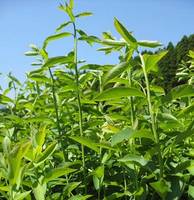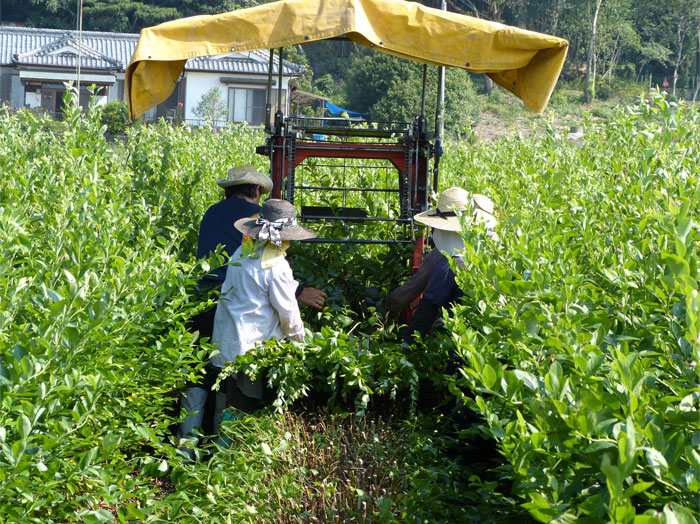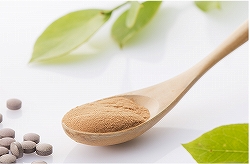Blueberry Leaves

Blueberry Leaves Have 10 Times the Antioxidative Power of Blueberries Themselves; Repel Viral Diseases.

Antioxidant Effects of Rabbiteye Blueberries Draws Attention.
Miyazaki is well known for its production of mangos, kumquats, and high quality specialized fruit trees. Its Rabbiteye blueberries have recently and suddenly drawn a lot of attention. The first thing most people think of when they hear the world "blueberry" is the violet berry itself. Its nutritional anthocyanin polyphenol gives the berry its color, and it has been medically proven to help protect eye health.
The truth is that there lies more power in the blueberry leaf than in the berry itself. Blueberry leaves have 10 times the antioxidant potential of blueberries. Rabbiteye blueberry leaf is in particular a strong antioxidant. The polyphenol proanthocyanidin is an indispensable antioxidant for anti-aging care. Proanthocyanidin levels rise in the leaves as they bathe in the intense, southern sun of Miyazaki.

Southern Kyushu is known for having a preponderance of viral illnesses. Adult T cell leukemia (ATL), is considered an endemic virus, and cases of viral hepatitis such as hepatitis C are not uncommon either. Much research has been done by industry, government, and academia in Miyazaki on the effects of rabbiteye as a means of dietary prevention against and recovery from these kinds of illnesses. Among them are the Miyazaki Regional Collaborative Research Project and the Creation of Basic Cancer Prevention Technology Focused on Dietary Function. Specifically, reports have indicated lowered blood pressure, reduced propagation of hepatitis C, prevention of fatty liver, prevention of onset or worsening of liver cancer, and prevention of worsening of ATL, among other effects.
Blueberry Leaf Increases Interferon Levels.
Let's take a look at the power of rabbiteye based on the paper, "An Exploration of Highly Effective Food Products in Regards to Liver Disease Prevention," ("Functional Food" Vol. 3, No. 2 2009) compiled by Professor Hirofumi Uto (Kagoshima University Graduate Medical and Dental General Research Department).
Japan has relatively low mortality rates for liver diseases, but they rank fourth in terms number of patients nationwide, after cancer, heart disease, and strokes. There are numerous factors which might lead to liver diseases, such as alcohol or medicine intake. The one which requires the most caution is viruses. The majority of hepatitis cases in Japan are viral in nature. The number of viral hepatitis patients in Japan, including those with hepatitis B, is estimated at 3.5 million. However, only half that number are aware that they are infected.
The liver is known as "the silent organ." There are no visible symptoms for liver diseases such as hepatitis until they become serious. If left alone, viral hepatitis will progress into chronic hepatitis, cirrhosis of the liver, and liver cancer. In fact, 70-80% of cases of liver cancer were originally caused by chronic hepatitis or liver cirrhosis following from a viral hepatitis C infection.
The most highly recommended treatment for hepatitis C is interferon treatment, which is aimed at eliminating the virus or slowing down its spread. However, a number of patients may experience no results from treatment, or be unable to receive treatment due to advanced age.
Oxidative stress is known to contribute to the worsening of hepatitis C. Antioxidative food products secretly hold the potential to help improve these symptoms. Indeed, a hot water extract of blueberry leaves has been shown to slow down the propagation of hepatitis C. While a concentration of 10μg/ml or greater is harmful to our bodies, a non-poisonous dose leads to a drop in virus propagation that corresponds to the amount of interferon introduced. This effect is caused by proanthocyanidin. It has also been shown to limit the propagation of stellate cells, which accelerate liver fibrosis.
Currently rabbiteye tea and supplements are under development. Keep an eye out for a mark that reads "Jointly Developed by Miyazaki University and Miyazaki Prefecture." Recently, even higher quality products have emerged that combine the nutrients of both the blueberry and its leaves. These can also help relieve tired eyes.











